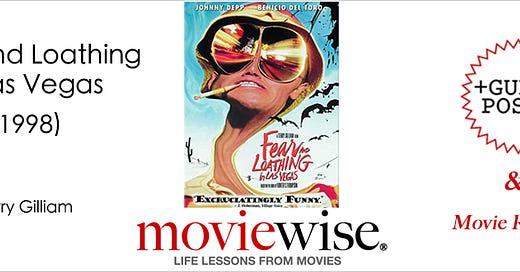"Fear and Loathing" (1998)—Just Say No?
+Guest Posts: Movie Wisdom By Guest Writer Art A.—Issue #4
Image by moviewise from RedBubble
The Movie:
Fear and Loathing in Las Vegas (1998) is a drama directed by Terry Gilliam based on the semi-autobiographical book set in 1971 by Hunter S. Thompson about a drug-fueled trip that two friends, Raoul Duke (Johnny Depp) and Dr. Gonzo (Benicio del Toro), take to the city of Las Vegas, Nevada.
Life Lesson: Just Say ‘No’ to drugs.
Duke: […] All those people who took him seriously—all those pathetically eager acid freaks who thought they could buy peace and understanding for three bucks a hit. But their loss and failure is ours, too. What Leary took down with him was the central illusion of a whole lifestyle that he helped create. A generation of permanent cripples, failed seekers…
Guest Writer:
Guest writer Art A. discusses the USA through the eyes of a Brit in Americauthentic
George McGovern’s campaign manager, Frank Mankiewicz, once called Hunter S. Thompson’s account of McGovern’s bid for Presidency “the least factual, most accurate account” in print. Few others have captured the appeal of Thompson’s work so succinctly.
In Fear and Loathing in Las Vegas’ jacket copy, Thompson describes Gonzo Journalism as “a style of ‘reporting’ based on William Faulkner’s idea that the best fiction is far more true than any kind of journalism” and suggests that “both ‘fiction’ and ‘journalism’ are artificial categories […] two different means to the same end.”
Fear and Loathing in Las Vegas, in both movie and book form, is meandering and downright bizarre in places. But more than twenty years later – has it really been that long?! – the film adaptation still offers an almost perfect hallucinogenic representation of the fever dream that is Sin City.
Most of us will never spend a drug-addled weekend in Las Vegas with a trunk filled with “two bags of grass, seventy-five pellets of mescaline, five sheets of high-powered blotter acid…” and all the rest but, thanks to Fear and Loathing, we don’t need to.
The movie has more to say beyond that though, on subjects like what it means to be human – “he who makes a beast out of himself gets rid of the pain of being a man” – and the many manifestations of the American Dream. But that one’s a gimme; it’s right there in the subtitle of the book: “A savage journey to the heart of the American dream.”
It also delves deep into the idea of friendship – at one point, Raoul Duke (Johnny Depp) calls his traveling buddy, Dr. Gonzo (Benicio del Toro), “one of God’s own prototypes, […] too weird to live, and too rare to die.” The duo bicker incessantly, but this statement is typical of their undying, sometimes begrudging, respect for each other.
Ostensibly, the film is about the pair’s quest to cover the Mint 400 for a magazine that’s probably standing in for Rolling Stone. But, although they make it to the starting line in the nick of time, there’s little there of interest for Duke or the audience.
It’s always been unclear exactly how much of Fear and Loathing “really” happened. Did Hunter S. Thompson actually see giant bats on his trip to Las Vegas with Oscar Zeta Acosta? And does it even matter when Raoul Duke is the only character who can see them in the film?
All of which feels like the other side of the coin, or maybe the same side of the coin in a different light, to Mark Twain’s idea that you should “never let the truth get in the way of a good story.”
He who makes a fiction writer out of himself gets rid of the pain of being a journalist.
Duke comments that “the idea of trying to cover this race in any conventional press sense was absurd,” and it’s this offhand remark that summarizes how Fear and Loathing in Las Vegas spawned a legion of wannabe gonzo journalists, many of whom are still trying to crib Thompson’s style more than 15 years after he put a gun in his mouth and pulled the trigger. Unfortunately, most of them are more concerned with trying to match Thompson’s heroic intake of alcohol and narcotics than his eye for “a good story.”
The biggest takeaway from this film, in my opinion at least, is an idea I try to keep in mind while doing my own first-person narrative writing, which I guess must make me one of those gonzo wannabes I mentioned above. It’s also a message that wouldn’t look out of place on a throw pillow:
It’s all about the journey and the story, not the destination.
moviewise Review:
Early in the film Fear and Loathing in Las Vegas (1998), one of the main characters wildly paws at the air, swatting away bats that aren’t there. It’s funny. This is classic slapstick humor. Guy being attacked by invisible bats is mildly aware that he may be acting irrationally, so he bats at the bats only when he thinks no one is looking. There is another funny scene a little bit later, when this same character tries to check into a hotel, but being high on a number of drugs, is barely coherent and under the illusion that he is surrounded by lizard people, man-eating carpets, and grotesque plastic humans. His antics while on drugs and the description of what’s happening to his body are both quite comical:
Ahh, Devil ether. It makes you behave like the village drunkard in some early Irish novel. Total loss of all basic motor skills. Blurred vision, no balance, numb tongue. The mind recoils in horror, unable to communicate with the spinal column, which is interesting because you can actually watch yourself behaving in this terrible way, but you can’t control it.
Then slowly the film begins to lose its humor. The main characters, Raoul Duke (Johnny Depp) and Dr. Gonzo (Benicio del Toro) are still laughing, but what earlier seemed like playful “stick it to the man” hijinks from two rebels just wanting to have a good time, then transforms into sociopathic, destructive, abusive, violent behavior that makes you question why it seemed funny when they nonchalantly walked out of a nice restaurant without paying the bill near the start of the movie. When the protagonists become less sympathetic as the movie progresses, it dawns on the viewer that all their behavior from the start has been horrible, irresponsible, terrifying, and depraved. These are not passionate dreamers despairing about the state of the world and seeking escape through drugs. The two main characters turn out to be monsters, freaks, who endanger others without any qualms, and embody the quote from Dr. Samuel Johnson that opens the film: “He who makes a beast of himself gets rid of the pain of being a man.”
Their slovenly, disgusting, unwashed appearance is not an expression of liberated minds rising above societal conventions. It’s actually a physical representation of their pathology. They don’t care about themselves, or others. “Sticking it to the man” only served to deprive the poor waiter of a living wage, a little man who is humiliated by having coins tossed at him by Duke in lieu of a tip, and is then knocked to the ground trying to run after these ruffians waving the unpaid bill. But the two drug-addled protagonists get away with it, and go on to destroy rental cars, trash hotels rooms, threaten women, terrorize others and each other. Their behavior is so brazen and so reckless that it seems they are begging for some authority figure to reign them in—the police, the sheriff, the traffic cop, the security guard—but no one does. No one is keeping an eye on them, so they just continue on their path of destruction, making the world they are trying to escape from by using drugs much worse for everyone.
This transition that happens in the movie—where initially the audience goes along with the freewheeling, carefree, fun 1960s/1970s counterculture represented therein and then is shown the underling horror—is brilliant. One has to imagine that this is how taking drugs typically starts and ends. At first, it’s just cool, joyous and freeing—until it isn’t anymore. Fear and Loathing in Las Vegas graphically shows the perverse dehumanizing journey when drugs take hold, ending with a beautiful poetic admonition that essentially tells viewers to “just say ‘NO’ to drugs” because you can’t find happiness, or understanding, or enlightenment through drugs or alcohol—oh, and no one “is tending the light at the end of the tunnel,” so you have to take personal responsibility for yourself. And that, dear reader, turns out to be one of the most important life-preserving life lessons you’ll ever find in any movie.
Addiction is the progressive narrowing of the things that bring you pleasure.
If you need help for drug addiction please visit: Alcoholics Anonymous, Alcohol Detox Resource, American Addiction Centers, Hazelden Betty Ford Foundation, Lily’s Place, Self-Management And Recovery Training, or call the Substance Abuse and Mental Health Services Administration helpline: 1-800-662-HELP (4357).
Want to publish your very own guest post on moviewise: Life Lessons From Movies and share with the world your most impactful, most wonderful, and most profound movies? Reply to this or leave a comment below to get started 🤗.
Visit the moviewise catalogue—a searchable database of one sentence movie summaries, movie quotes, and movie wisdom—for movie recommendations.
Also visit the moviewise store. Get a t-shirt, bag, or pillow with your favorite #LifeLesson from a movie. Reply to this or leave a comment below to make a request.












It's hard to bring Hunter to life in a movie. It's actually impossible. I would love to see a really good movie about the hells Angels, but I just don't think it could be done. Gilliam did what he could with this, but he has a directing style that make all his work look like a Terry Gillian movie. 12 monkeys looked like Brazil. This movie looks like Brazil. The other thing is that Johnny Depp should not be allowed to play anybody that he admires. He should never play. Keith Richards, for example. Likes it too much. His Hunter was too much for me. It reminded me of Matt Dylan playing bukowski in Factotum. Hell some of it reminded me of Mickey Roarke playing Hank in barfly. The meat of the story was about the juxtaposition of the weird things they were doing with the extraordinarily conservative atmosphere of the convention. But enough of my grumbling. I'm always happy to see someone take the time to do a thorough review.
Oh this is great. Never seen the movie, but read the book. I really like Art A. mentioning "Thompson describes Gonzo Journalism as “a style of ‘reporting’ based on William Faulkner’s idea that the best fiction is far more true than any kind of journalism." ...love this! And your conclusion: "...you have to take personal responsibility for yourself." If only more people....
One day I'll watch Dead Poet's and write that review!